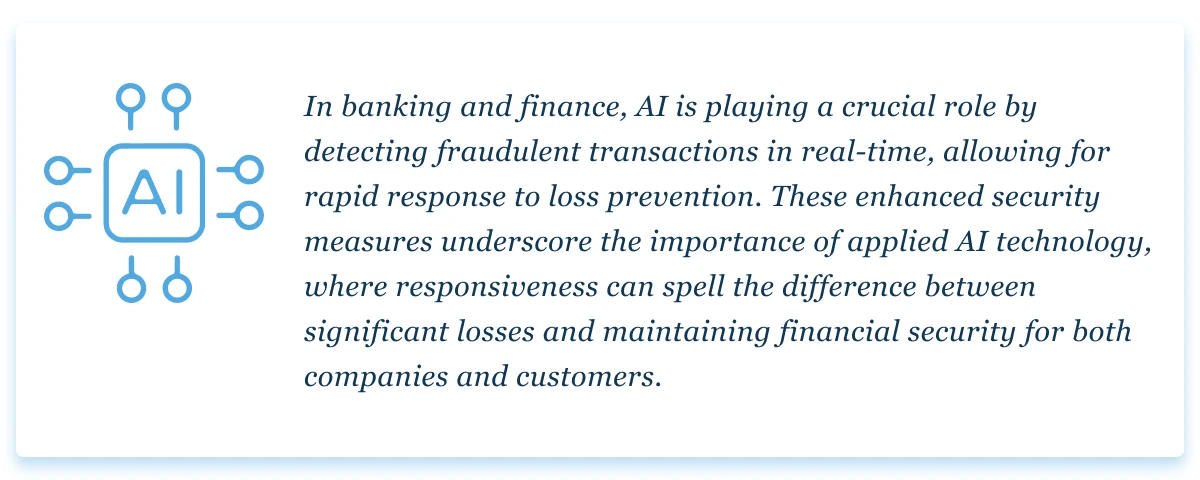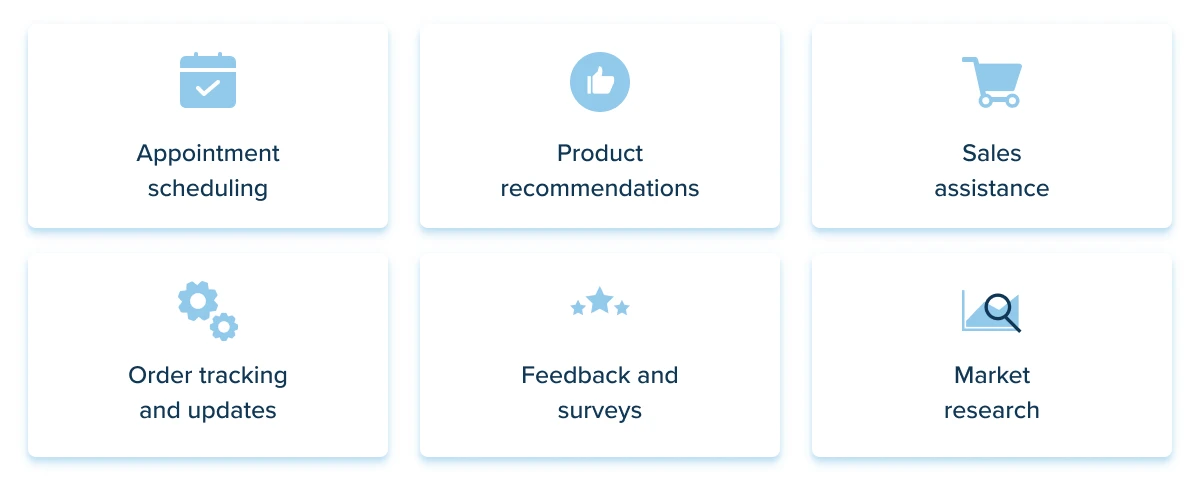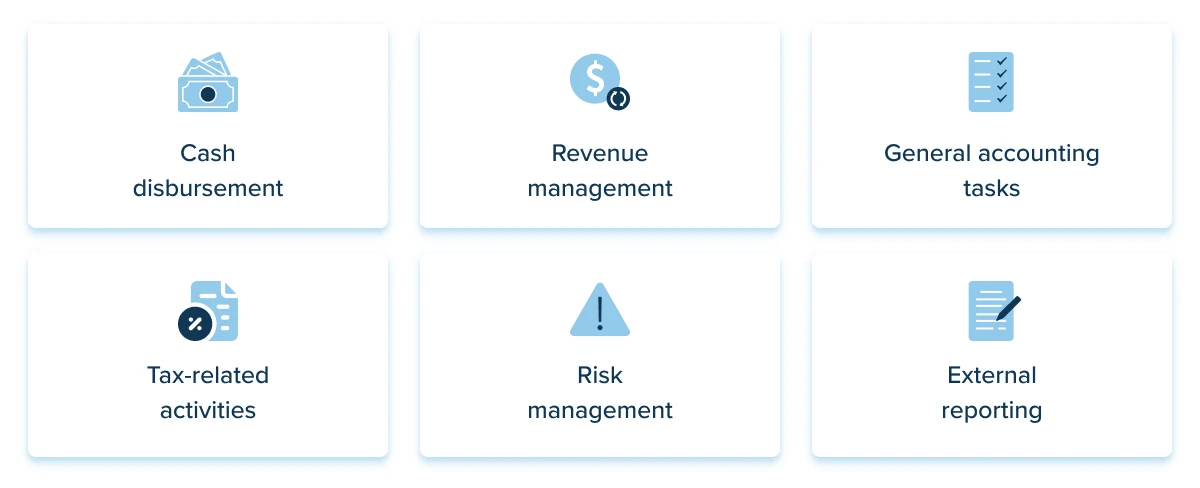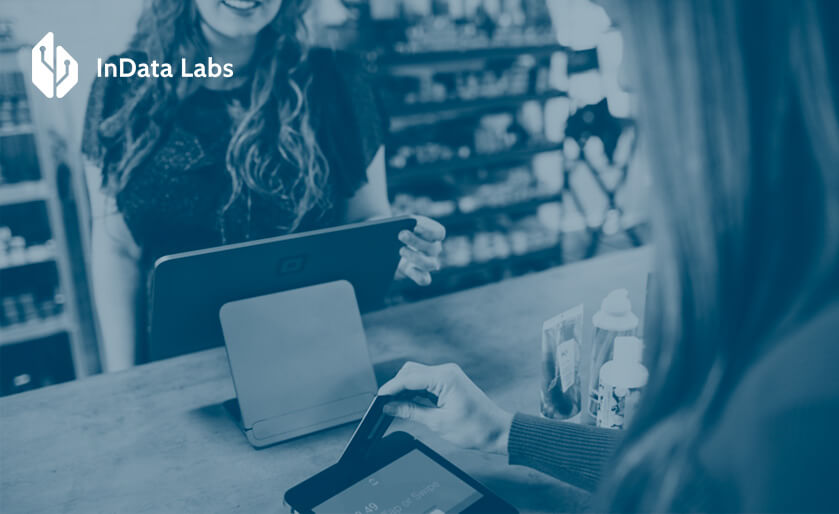Artificial intelligence (AI) disrupts industries while changing how people work and interact. Today’s artificial intelligence business applications include marketing automation, chatbots, predictive analytics, and other processes driving operational efficiency. Companies, big and small, can leverage this trend to stay at the forefront of innovation and ensure continuous growth.
One of the stellar business intelligence applications examples is Amazon which uses AI to deliver highly personalized shopping experiences. Industry giants like Amazon, Netflix, and Microsoft invest billions in AI, and their efforts pay off. The company also launched Amazon Echo, a line of AI-powered devices for smart homes. Google and YouTube, on the other hand, tap into the power of AI to help advertisers optimize conversions.
This technology has become integral to business operations, but only some organizations understand its full potential. That said, here’s what every company should know about using artificial intelligence in business and why it matters.
How companies use AI to drive operational excellence
According to IBM, over one-third of companies worldwide reported using AI in 2022. Not surprisingly, another 42% said they plan to implement this technology soon. Most leaders express their interest in artificial intelligence applications related to research and development (R&D), employee reskilling, or developing proprietary solutions.
Machine learning, chatbots, computer vision, data analytics and natural language processing are all potential applications of artificial intelligence in business. For example, 25% of companies will likely use chatbots as their primary customer service channel within the next four years. Thanks to this AI-based technology, businesses can provide 24/7 customer service at a fraction of the cost.
Organizations can also leverage artificial intelligence and applications based on it to streamline recruitment, boost productivity, and make data-driven decisions. An example is programmatic marketing, which uses AI-driven data insights to segment and target audiences. Artificial intelligence also has many applications in every business industry – real estate, financial services, agriculture, car manufacturing, and other sectors.

Source: Unsplash
For instance, banks use this technology for credit scoring, fraud detection, and robo-advisory services. Furniture manufacturers employ AI to create interactive 3D showrooms and empower buyers to design their spaces. The best part is companies of all sizes can tap into these trends to drive business growth.
Examples of artificial intelligence in business: Paving the way to innovation
As more businesses catch on to the capabilities of AI, they are integrating this AI technology into their operational framework, setting the stage for innovative approaches to traditional business practices.
Two similar sectors widely applying this type of technology are the logistic and supply chain management industries. Artificial intelligence applications are undeniably crucial here as they improve efficiency in warehouse operations, optimize routes for delivery, and predict demand to manage inventory effectively. These AI solutions not only enhance overall productivity but also lead to substantial cost and labor savings.

These are just a few broad examples of artificial intelligence in business. As we continue to explore the potential of AI, let’s delve deeper into 11 applications of AI you can apply to your own business to stay ahead of the curve.
11 AI applications for small business success
According to IBM, large enterprises are twice as likely as smaller companies to use AI. But even so, more than 40% of small businesses are now deploying AI technologies, and 28% have a holistic strategy.
Small and medium-sized businesses (SMBs) can use AI to reach peak productivity and cut costs. This technology also allows them to improve the customer experience, leading to higher revenue and sales.
Similarly, AI can power up their marketing efforts, from content creation to advertising. Over time, it can increase customer loyalty, brand awareness, employee retention, and work performance.
With that in mind, here are some of the most popular applications of artificial intelligence for business.
Customer service and related activities
Chatbots and virtual assistants are AI-powered apps that simulate and process human conversation. This technology uses natural language processing and artificial intelligence to generate text and/or voice messages.
Small businesses can use chatbots to streamline lead generation, customer support, and other operations, such as:

For example, chatbots can interact with potential buyers, collect information, and qualify leads. Moreover, they can ask relevant questions to gain further insights and make personalized recommendations.
Health clinics, gyms, and other businesses also use chatbots for appointment scheduling. The bot can act as a virtual assistant, allowing customers to book appointments easily. It can check the available dates, suggest suitable time slots, and confirm appointments, streamlining the scheduling process.
These features allow companies to reduce overhead and operational costs, improve customer satisfaction, and drive conversions. Additionally, implementing chatbots is easier and cheaper than hiring extra staff, making it one of the top latest artificial intelligence applications.
Recruitment marketing and talent sourcing
Cultivating an effective recruitment marketing strategy can take time and effort for startups and SMBs. This process requires in-depth knowledge of the market and human and financial resources.
Artificial intelligence can streamline recruitment marketing, too. Companies worldwide use AI to optimize their job ads, source and screen candidates, analyze their responses, and match job seekers to open positions that align with their skills.
For instance, some AI tools can scan social media profiles to identify potential hires based on specific criteria. Others can help reduce unconscious bias in hiring, ensuring equal opportunities for all candidates.

Source: Unsplash
Employers can also use AI-powered tools for video interviews and assessments, employee onboarding, and human resources management. A good example is Stanford Health Care, which employs chatbots to collect candidate information, suggest relevant jobs, and answer questions from potential hires.
AP automation
The ever-increasing using of artificial intelligence for business applications translates into higher efficiency and lower costs. SMBs can leverage this technology to automate repetitive tasks, allowing employees to focus on higher-value activities.

Take accounts payable (AP), for example. Small businesses can streamline AP with an invoice processing platform that supports automation. Depending on the platform, they can automate one or more of the following:
- Data entry
- Bank reconciliation
- Invoice receipt and approval
- Reporting
These practices can help prevent data entry errors, enable faster payments, and boost AP efficiency. They also allow finance departments to view and track all transactions processed through the system, thereby avoiding duplicate payments.
Bookkeeping and accounting
Accounts payable is one of many accounting functions you can automate with AI. In fact, companies can automate over 40% of finance activities, including but not limited to:

AI can automate up to 77% of general accounting processes, from complex journal entries to payroll. The same goes for some or all financial planning, budgeting, forecasting, and treasury management activities.
For example, finance departments can employ AI to extract information from invoices, receipts, and other documents and automatically fill out the corresponding fields in spreadsheets. This process eliminates the need for manual data entry, saving time and preventing errors.
Predictive analytics
One of the most important AI applications for business leaders includes the ability to analyze large amounts of data. Marketers can leverage this feature to predict future outcomes related to sales, customer churn, market dynamics, and other business areas.
Therefore, AI and machine learning allows for more accurate forecasting, which may help improve business performance. For instance, online retailers can employ these technologies to forecast customer demand and market trends. Later, they’ll use this data to adjust their inventories or tweak their marketing strategies.
Predictive analytics also play a key role in advertising, helping companies identify the best ways to reach potential buyers. Enterprises across all industries use AI to analyze customer data, past trends, and other data sets so they can:
- Reach the right people with the right message
- Forecast customer behavior
- Deliver personalized experiences across multiple channels
- Lower their advertising costs
- Mitigate advertising bias
- Reduce customer churn rates
- Boost audience engagement
Marketers can also deploy AI to determine which blog topics drive the most engagement or which customers are most likely to buy specific products. This information allows them to allocate resources more effectively, saving time and cost.
Content marketing
More than 70% of B2C companies and 73% of B2B companies create content as part of their marketing strategy. However, about one-third of B2C companies—especially small businesses—don’t have an in-house team dedicated to this task.
Content marketing can be expensive and time-consuming, so it’s unsurprising many entrepreneurs turn to ChatGPT for help. Such neural networks and other business applications of machine learning have become integral for effective marketing. Chat by ChatGPT alternatives are even more efficient, allowing marketers to create unique content, from blog posts and newsletters to subject lines.
Despite their differences, these tools share one thing: they all use AI and deep learning to generate content. For example, Copy.ai can create blog titles, social media captions, slogans, mottos, and LinkedIn headlines in seconds.
An artificial intelligence app of this kind can also analyze user behavior and suggest relevant content to individual customers. Others can optimize the content for search engines, analyze its performance, and identify areas of improvement. On a similar note, a range of applications of AI in marketing may include keyword research, content promotion, or social media management.
Content creation requires a human touch. AI tools cannot replace human insight and creativity but are invaluable for research. Companies that create an artificial intelligence app of this kind can speed up the creative process and improve marketing outcomes when used properly.
Search engine optimization
You must optimize websites and blogs for search engines to gain enough visibility online. This practice is called search engine optimization (SEO) and encompasses a variety of techniques, such as keyword research, content creation, and link building.
Some of the best SEO tools use AI to analyze behavioral metrics, search engine data, and social media trends. These apps can analyze website performance, page speed, and other technical aspects, track keyword rankings, generate reports, and more.
For example, Semrush is the best artificial intelligence app for SEO that conducts keyword research, market research, content creation and optimization, and backlink gap analysis. Marketers can use it to improve their web copy, discover long-tail keywords, and analyze website traffic.
Another popular choice is Frase.io, an AI-powered tool that can generate optimized content briefs. It also provides insights into the best-performing pages on a topic, allowing marketers to create even better content.
Work productivity
By now, it should come as no surprise that AI drives productivity and efficiency. For instance, an MIT study found that ChatGPT can boost productivity by over 40% and improve work quality by about 20%.
As discussed earlier, businesses can build artificial intelligence apps to automate marketing, accounting, customer service, and other operations. Moreover, users can set up automated workflows and focus on higher-value tasks. The result? Increased work efficiency, better results, and higher performance.
Another piece of evidence comes from the National Bureau of Economic Research. First, scientists gathered data from more than 5,100 customer support agents and analyzed the results.
As it turns out, AI-powered chatbots can increase the number of issues resolved per hour by 14%. Not only does this technology improve customer satisfaction, but it can also boost employee retention and help new hires do their jobs better.

Source: Unsplash
What’s more, AI can boost collaboration between teams and departments. Microsoft Teams, Zoom, Workhub, and other collaboration tools have the potential to streamline remote work, employee communications, and project management, among other aspects. Some of their key features, such as automatic transcription, would not exist without AI technologies.
Decision making
The Wharton School offers an online course called “AI for Decision Making: Business Strategies and Applications,” which covers the use of AI in finances, marketing, HR, and other areas. The program aims to help business leaders make faster, smarter decisions by tapping into this technology.
AI can streamline decision-making and improve a company’s bottom line. For example, a possible application of artificial intelligence in business lies in analytics and reporting capabilities. AI-powered tools can analyze large data volumes, identify patterns, and provide actionable insights. Business leaders may use this data to understand customer behavior, market trends, and other factors.
AI also helps organizations evaluate and manage risks effectively. SMBs can deploy this technology to analyze historical data, market conditions, and potential threats and then take the steps needed to mitigate risk.

For instance, manufacturers may use AI-powered simulations to test new products before selling them. On the other hand, retailers can deploy this technology to predict and optimize product pricing based on customer demand and market trends. Companies can also use AI for employee performance assessments and other internal processes that rely on data.
Business intelligence
On a similar note, small and large enterprises can leverage AI to gain deeper insights into their competitors, customers, or the performance of their operations. The application of AI in business intelligence spans multiple areas, including:
- Predictive analytics
- Customer segmentation
- Market research and competitive analysis
- Sentiment analysis
- Financial analysis and planning
- Real-time data monitoring
- Fraud detection
- Demand forecasting
- Process optimization
For example, AI can help companies gauge customer sentiment around their products or services and make necessary improvements. These insights enable businesses to create better products, anticipate customer needs, and address potential issues early on.
AI-powered algorithms can also analyze transaction data, patterns, and unusual activities to detect fraud. Plus, it enables online merchants to approve or decline orders in real-time and reduce false positives. As a result, it may help enterprises prevent financial losses and improve business security.
User experience (UX)
One of the most widespread business applications for artificial intelligence relates to user experience (UX). This factor impacts customer satisfaction, loyalty, and the company’s brand image. Therefore, it’s no surprise that every dollar invested in UX brings up to $100 in return.
AI can improve the user experience by allowing for more personalized and effective communications. By leveraging AI algorithms, SMBs can provide custom content, relevant product recommendations, and seamless shopping experiences.
For example, online retailers can implement AI-powered visual search solutions. This technology enables buyers to search for specific products by using real-world images. If, say, a person sees someone wearing a cool jacket, he can take photos of the jacket and then use Google Lens or other apps to find it in online stores. Last but not least, chatbots and other AI tools integrate Natural Language Processing (NLP), a technology that enables users to interpret user queries, commands, and other data.
Marketers can use this information to delve deeper into customer behavior and personalize their messaging. Additionally, these tools can continuously learn from user interactions and feedback and become more efficient. As a result, they’ll generate more accurate insights and adapt to ever-changing customer needs.
“Artificial Intelligence: Business Strategies and Applications,” an online course offered by the University of California, Berkeley, provides more information on this topic. Another great resource is “Artificial Intelligence Business Applications,” an eBook available on Amazon. Leaders can also look into AI business use cases to better understand how this technology works.
These materials detail how to use AI to improve the user experience, automate routine operations, and achieve operational excellence.
Leverage the power of AI for business growth
Artificial intelligence has huge potential, and it’s only getting better and better. Any business, big or small, can employ this technology to become more customer-centric, drive sales, and increase productivity.
The business applications of AI also impact human resources. AI startups and small companies may use AI-powered tools to attract talent and build a more inclusive culture. This practice can give them a competitive advantage and improve their bottom line.
We cannot overstate the role of AI in marketing and sales. This technology can increase the number of leads and appointments by over 50%, decrease costs by up to 60%, and reduce call time by up to 70%. At the same time, it allows for more personalized customer experiences and better-targeted marketing campaigns. It’s also worth mentioning that many AI tools are free or require a small monthly fee. Small companies can use these apps to realize their AI business ideas and get more done in less time.
While AI cannot replace human beings, it may reduce the need for additional staff and cut overhead costs. This aspect alone makes it invaluable for startups and entrepreneurs.
Custom AI development for your business needs
Looking for a trusted AI technology vendor to help you with a project? Book a consultation with our specialist to discuss it in detail.



